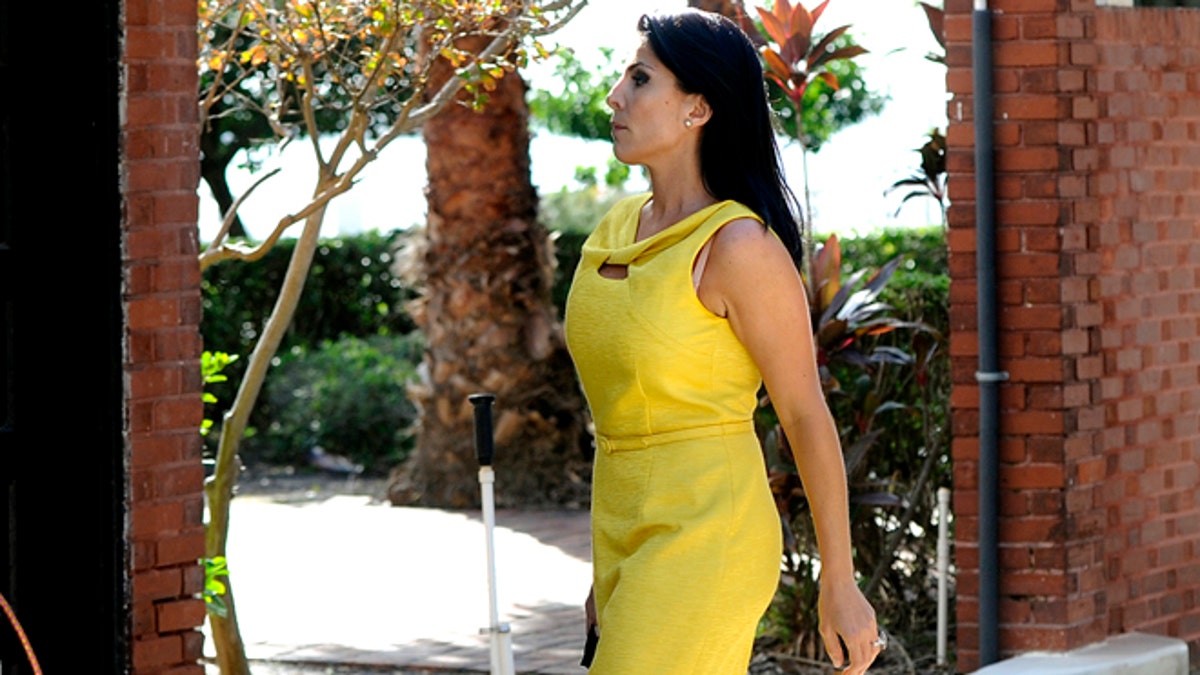
Nov. 12, 2012: Jill Kelley, a friend of the Petraeus family, walks out of her home toward her car in Tampa, Fla. (Reuters)
When Jill Kelley told me earlier this year that she was "terrified" after receiving anonymous and threatening emails that turned out to be from David Petraeus' mistress, it was hard not to sympathize with someone who'd been drawn into a scandal not of her making.
Now we are learning more about what happened.
Turns out that Paula Broadwell, Petraeus' biographer and onetime lover, did more than harass Kelley online. According to one person familiar with the case, Broadwell physically followed Kelley on a couple of occasions.
In one instance, Broadwell sent an email indicating that she had seen Kelley at a private meeting with a top U.S. official, Vice Adm. Robert Harward.
Another Broadwell note said she knew in advance of a secret dinner involving Kelley, a handful of top U.S. officials and Gen. John Allen, then the top American commander in Afghanistan, who was to travel to the United States for the get-together. That email sparked security concerns.
The scandal cast a harsh light on Kelley's friendships with Allen and Petraeus, who resigned as CIA director last November and apologized for his extramarital affair with Broadwell. Allen retired after the controversy complicated his nomination to be NATO's supreme commander.
A Tampa woman known for her parties attended by top military types from the nearby U.S. Central Command, Kelley recently sued the FBI and the Pentagon. Kelley, who had been an honorary consul for South Korea, charges that government officials slandered her through "damaging leaks, cavalier sexual innuendo" and "old-fashioned 'blame the victim' discrimination" that made her a media target as the scandal's Other Other Woman -- or as the suit puts it, "fanning the flames of the 'vixen' storyline."
She wasn't the only target. Under such names as "Kellypatrol" and "Tampa Angel," Broadwell also sent anonymous messages to a number of U.S. officials, including what the suit calls "threatening and defamatory emails about Mrs. Kelley" to Petraeus and Allen.
Kelley had a regular email correspondence with Allen that some unnamed officials have described as flirtatious, although the volume was nothing like the early media reports that said they had exchanged 30,000 emails. An inspector general's review cleared Allen of any wrongdoing. As for Broadwell, an officer in the Army reserves who has apologized for her conduct, her spokeswoman has correctly noted that "the Justice Department thoroughly looked at this and declined to prosecute."
The first anonymous Broadwell email was sent to Allen in May 2012; he forwarded it to Kelley.
Broadwell emailed Kelley's husband Scott on June 3, 2012. In that message, I am told, Broadwell urged the surgeon to "rein her in before we shame senior military and public officials and foreign ambassadors with whom she has contact. Otherwise, become an embarrassment to all."
Kelley says she didn't even know that and subsequent emails were from a woman. She is not commenting now, but she told me in the earlier interview, "It was devastating. To have your privacy invaded is truly-there are no words to describe it."
Alarmed by the correspondence, Kelley went to a local FBI agent with whom she was friendly, Fred Humphries, triggering the chain of events that led to Petraeus' resignation and Allen's retirement. But after granting the FBI limited access to her email account for the investigation, she now blames unnamed officials there for leaking her name and her role in the case.
The suit says Humphries (who briefly gained fame for sending friends a shirtless photo) told Kelley that other agents "confronted" him and "accused him of having sexual relations with her." In a separate incident, according to the suit, FBI agents showed up at Kelley's home, told her to leave her three children with the nanny, took her into an SUV, declined her requests for a lawyer and "demanded that she answer bewildering questions regarding her relationship with Director Petraeus and General Allen -- including insinuations and accusations that she was engaged in adulterous activity."
I bring this up because there is no evidence that Kelley had an affair with anyone-she corresponded with Allen through the account she shares with her husband-and yet she was dragged through the media mud. There was a blizzard of headlines such as "Petraeus Affair: Who Is Jill Kelley?" and "The 'Other Woman' In The Petraeus Scandal Is Tampa Resident Jill Kelley." Two unnamed U.S. officials were quoted as saying some of her emails with Allen were "the equivalent of phone sex."
The suit says Kelley's reputation is "indelibly tainted" and that the leaks have hurt her business and social prospects in Tampa. We'll have to see how she fares in the courts; leaks, for one thing, are awfully hard to prove. Federal authorities have not yet responded to the suit.
But these new details leave me with the same question I had after spending two hours talking to Jill Kelley back in January: What exactly did a woman whose only crime was a friendship with top American leaders, and who found herself being cyberstalked, do to deserve all this bad press?




